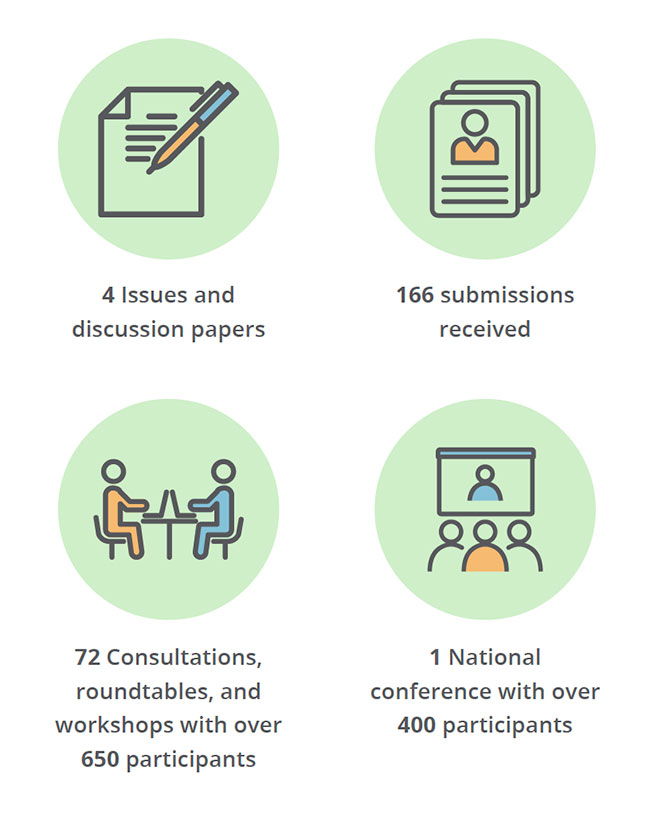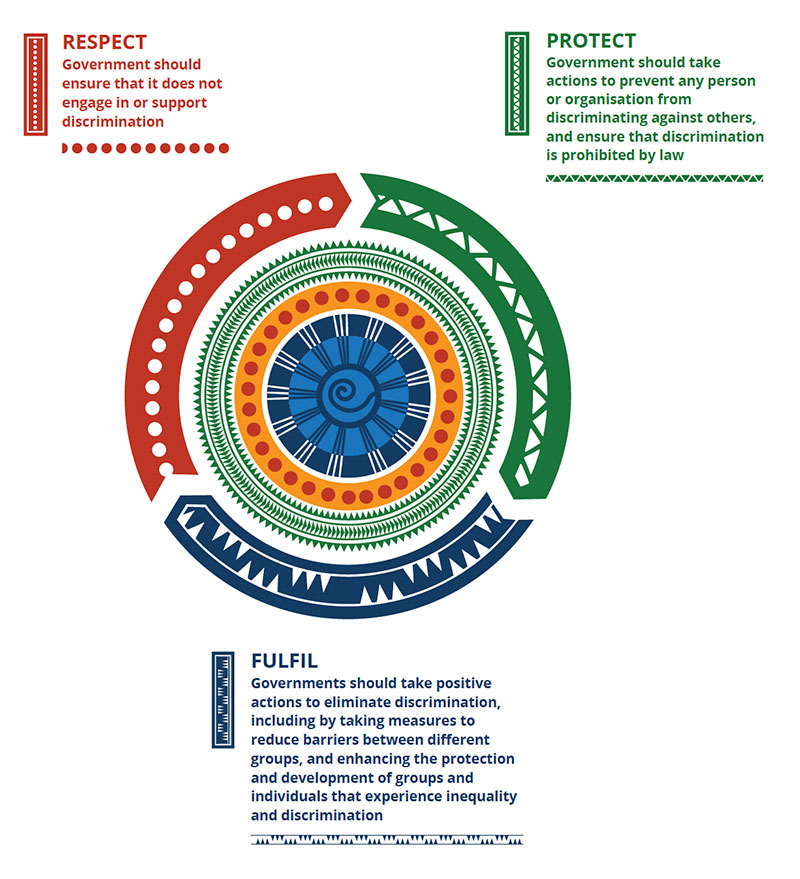Free and Equal: A reform agenda for federal discrimination laws (2021)

Free and Equal – A national conversation on human rights
This Position Paper sets out the Australian Human Rights Commission’s proposals for reforming federal discrimination law in Australia. It forms part of the Commission’s Free and Equal project: A National conversation on human rights.
Summary documents
1.1 How has the national conversation project progressed?
The national conversation project was announced on 10 December 2018, Human Rights Day, and commenced in early 2019. In 2019 the Commission:
- released an Issues Paper – setting out consultation questions for the national conversation[i]
- released three Discussion Papers – on federal discrimination law reform; framing of rights; and accountability mechanisms for human rights at the national level[ii]
- conducted the Free and Equal national conference on human rights[iii]
- convened a series of roundtables with the United Nations High Commissioner for Human Rights, Dr Michelle Bachelet
- convened a series of roundtables with Professor Manfred Nowak, and hosted the Pacific launch of the United Nations Global Study on Children Deprived of Liberty
In 2019 and into 2020, the Commission opened a public submission process for the Discussion Papers as well as conducting consultations nationally. We received over 160 written submissions, with 190 people participating in national consultations.
The Commission also convened a series of technical workshops on key thematic issues:
- August 2019: Ensuring Effective National Accountability for Human Rights Workshop convened in partnership with the Human Rights Institute at UNSW
- May 2021: Technical workshop on improving parliamentary scrutiny of human rights, convened in partnership with the Castan Centre for Human Rights at Monash University and the University of Adelaide
- October–December 2020: roundtables and industry consultations on federal discrimination law reform with industry, unions, government, community legal centres and legal aid agencies, academics, barristers, and NGOs
- April–June 2021: roundtables on the positive framing of human rights and the key elements of a federal Human Rights Act.
In July 2020, the Commission also provided a report to the United Nations Human Rights Council as part of Australia’s 3rd Universal periodic review. The UPR review then occurred in January 2021. In this report, the Commission made a series of recommendations for specific human rights reforms at the law and policy level in Australia across key issues such as gender, Indigenous rights, immigration and asylum seekers, age, race and disability discrimination, and appropriately balancing rights in the time of the COVID-19 pandemic.
In 2020, the Commission focused on the pressing issues that arose as the COVID-19 pandemic unfolded, and extended finalisation of the project until 2021.
Figure 1.1: Consultation processes

1.2 The obligations to respect, protect and fulfil human rights
This Position Paper is the first in a series of papers setting out the Commission’s proposed reform agenda for the better protection of human rights at the national level in Australia.
Each of the Position Papers is designed to complement the others, and to address necessary human rights reforms across different areas of law, policy and practice.
Each paper identifies actions necessary for Governments to meet their obligations to respect, protect and fulfil human rights.
- The obligation to respect human rights requires that governments, through their own actions, do not breach human rights.
- The obligation to protect human rights requires governments to take actions to prevent others from breaching human rights. Where a person's rights have been breached, the obligation to protect also requires governments to ensure accessible and effective remedies are available to that person.
- The obligation to fulfil human rights requires governments to take positive actions to fully realise the equal enjoyment of human rights.
These different obligations reflect that there is no one single action that can fully protect human rights or remedy a breach of human rights. It requires a mixture of actions ranging from legal protections, complaint and compensatory processes, educative measures, community-based programs and social services, for example.
Because human rights aim to protect people’s essential dignity and ensure fairness of treatment, it is especially important to ensure that there is a strong focus on prevention of breaches of human rights from occurring in the first place.
Federal discrimination law has a key role to play in meeting Australia’s obligations across each domain: to respect, protect and fulfil human rights.
One of the key findings of the Commission’s work is that the existing system of federal discrimination law is primarily geared towards the remedial aspects of the obligations to respect and protect, and even with this as its main focus, it falls short of realising effective remediation for discrimination.
There are gaps in the protection offered by these laws, as well as significant questions as to how accessible the discrimination law system is – particularly for marginalised or disadvantaged groups. This suggests that federal discrimination law could be more effective in meeting these obligations to respect and protect rights.
As outlined in this Paper, there is also a pressing need to shift the focus of the federal discrimination law system to a more preventative approach, and towards actions that better support the fulfilment of rights.
Federal discrimination law reform would contribute to each of the 3 main sets of obligations of the federal government to respect, protect and fulfil human rights.
Figure 1.2: Obligations to respect, protect and fulfil human rights

[i] Australian Human Rights Commission, Free and Equal: Issues Paper (April 2019).
[ii] Australian Human Rights Commission,Discussion Paper: Priorities for federal discrimination law reform (2019) : Australian Human Rights Commission, Discussion paper: A model for positive human rights reform (2019) ; Australian Human Rights Commission, Discussion paper: Ensuring effective national accountability for human rights (2019) .
[iii] ‘Free and Equal Conference’, Australian Human Rights Commission (Web Page, 2019) .


